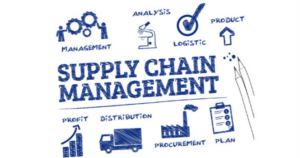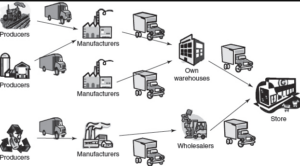MBA in Supply Chain Management – In today’s fast-paced business environment, Supply Chain Management (SCM) is more crucial than ever. An MBA in Supply Chain Management not only equips you with the skills to optimize operations but also prepares you for leadership roles in a variety of industries. Let’s dive deep into what this degree entails, the benefits it offers, and how it can transform your career!
What is an MBA in Supply Chain Management?

An MBA in Supply Chain Management is a specialized Master of Business Administration degree that focuses on the principles and practices of managing supply chains effectively. The curriculum covers various aspects, including logistics, procurement, inventory management, and operations strategy.
Key Components of the Program
- Operations Management: Learn how to streamline processes and enhance productivity.
- Logistics and Transportation: Understand the complexities of moving goods efficiently.
- Supplier Relationship Management: Develop skills to foster strong partnerships with suppliers.
- Data Analytics: Utilize data to make informed supply chain decisions.
Benefits of an MBA in Supply Chain Management
1. Career Advancement Opportunities
An MBA in Supply Chain Management positions you for a range of leadership roles across various industries. Graduates often find themselves qualified for positions such as:
- Supply Chain Manager: Overseeing and managing the entire supply chain process to maximize efficiency and minimize costs.
- Logistics Director: Coordinating the movement of goods and materials, ensuring timely delivery and optimal transport routes.
- Operations Manager: Streamlining operations and improving processes for maximum productivity.
- Procurement Specialist: Managing purchasing and vendor relationships to secure materials and services at the best prices.
With an MBA, you enhance your qualifications and make yourself a more attractive candidate for these high-level positions.
2. Higher Earning Potential
Earning an MBA can lead to significant salary increases. According to the Graduate Management Admission Council (GMAC), MBA graduates earn on average:
- $105,000 in their first job after graduation, compared to $65,000 for those with only a bachelor’s degree.
- Experienced professionals can earn salaries ranging from $85,000 to over $150,000 depending on the industry and location.
This substantial salary boost makes the investment in an MBA worthwhile.
3. Comprehensive Skill Development
An MBA program in Supply Chain Management equips you with essential skills that are highly valued in today’s job market:
- Analytical Skills: Develop the ability to analyze complex data sets and make informed decisions.
- Strategic Thinking: Learn to develop and implement strategies that align with business goals.
- Leadership: Gain leadership skills necessary to manage teams and projects effectively.
- Negotiation: Master negotiation techniques to secure favorable terms with suppliers and partners.
These skills are critical for managing the complexities of supply chains effectively.
4. Networking Opportunities
Studying for an MBA provides access to a vast network of professionals, including:
- Alumni: Connect with former graduates who can provide mentorship, job leads, and industry insights.
- Professors: Learn from industry experts who often have extensive networks themselves.
- Fellow Students: Collaborate with peers from diverse backgrounds, leading to potential partnerships and business opportunities in the future.
This network can be invaluable for career advancement and professional growth.
5. Industry Relevance and Innovation
Supply Chain Management is rapidly evolving due to technological advancements and globalization. An MBA program keeps you updated on:
- Latest Trends: Understand the latest technologies such as Artificial Intelligence (AI), Machine Learning (ML), and blockchain in supply chain processes.
- Best Practices: Learn about emerging practices that enhance efficiency and sustainability in supply chains.
- Global Perspective: Gain insights into global supply chain issues, such as tariffs, regulations, and international logistics.
Staying informed about these developments makes you a valuable asset to employers.
6. Flexibility and Versatility
An MBA in Supply Chain Management prepares you for various roles across multiple sectors, including:
- Manufacturing
- Retail
- Healthcare
- Technology
This versatility allows you to explore different career paths and adapt to changes in the job market.
7. Real-World Experience
Many MBA programs emphasize practical learning through:
- Case Studies: Analyze real-world supply chain challenges and develop solutions.
- Internships: Gain hands-on experience with companies in your field of interest.
- Consulting Projects: Work with organizations to solve supply chain issues, providing immediate value to your resume.
These experiences not only enhance your learning but also build your professional portfolio.
8. Problem-Solving Skills
A core focus of an MBA in Supply Chain Management is developing problem-solving skills that enable you to:
- Identify Issues: Quickly pinpoint inefficiencies and bottlenecks in supply chain processes.
- Develop Solutions: Create actionable plans to address challenges.
- Implement Changes: Lead the execution of new processes or technologies to improve operations.
Real-World Examples of Supply Chain Management Tools and Technologies

To complement your MBA, familiarize yourself with some cutting-edge supply chain management products. Here are five notable options:
1. SAP SCM
- Overview: SAP SCM offers a robust suite of tools for managing supply chain processes from planning to execution.
- Website: SAP SCM
2. Oracle SCM Cloud
- Overview: A comprehensive cloud solution that enhances visibility and agility across the supply chain.
- Website: Oracle SCM Cloud
3. IBM Sterling Supply Chain Insights
- Overview: Leverages AI and blockchain technology to optimize supply chain operations and decision-making.
- Website: IBM Sterling
4. JDA Software (now Blue Yonder)
- Overview: Offers integrated supply chain planning and execution solutions that enhance collaboration and efficiency.
- Website: Blue Yonder
5. Kinaxis RapidResponse
- Overview: Provides an agile platform for supply chain planning, enabling real-time visibility and collaboration.
- Website: Kinaxis
Comparison Table of Supply Chain Management Tools
| Product | Use Case | Pros | Cons | Price | Features |
|---|---|---|---|---|---|
| SAP SCM | Comprehensive SCM management | Integrates well with other SAP products | Can be expensive | $4,000+/year | Real-time data, forecasting |
| Oracle SCM Cloud | Cloud-based supply chain solutions | High scalability | Requires training for users | $6,000+/year | Analytics, visibility |
| IBM Sterling | AI and blockchain in SCM | Advanced technology | Complexity in setup | $5,500+/year | AI-driven insights |
| JDA Software (Blue Yonder) | Planning and execution | User-friendly interface | Limited customization options | $4,500+/year | End-to-end solutions |
| Kinaxis RapidResponse | Agile supply chain planning | Fast implementation | Higher cost | $7,000+/year | Collaboration, real-time updates |
Why You Need an MBA in Supply Chain Management?

1. In-Demand Skill Set
The global economy relies heavily on efficient supply chain processes. An MBA in SCM equips you with essential skills, including:
- Logistics Management: Understanding how to optimize the movement of goods.
- Operations Strategy: Learning how to streamline operations for better efficiency.
- Data Analytics: Analyzing complex datasets to inform decision-making.
These skills are increasingly sought after by employers, making you a valuable asset in any organization.
2. Career Advancement Opportunities
An MBA in SCM opens doors to various leadership positions, such as:
- Supply Chain Director: Responsible for the overall supply chain strategy.
- Operations Manager: Focuses on improving operational efficiencies.
- Procurement Manager: Manages supplier relationships and purchasing strategies.
With advanced knowledge and skills, you are more likely to ascend to these high-level roles, increasing your influence within your organization.
3. Higher Earning Potential
Graduates with an MBA in Supply Chain Management often command higher salaries compared to their counterparts with only a bachelor’s degree. For instance:
- Average Salary: According to industry reports, MBA graduates in supply chain management can earn an average starting salary of $105,000, significantly higher than the typical salaries for other business roles.
- Long-Term Financial Benefits: Over the course of your career, the earning potential for MBA graduates can be substantially greater than for those without advanced degrees.
4. Global Perspective
Supply chains are inherently global, involving multiple countries and cultures. An MBA program provides:
- Cross-Cultural Training: Understanding how to navigate different business practices and cultural expectations.
- Global Supply Chain Trends: Keeping up with international regulations, tariffs, and trade agreements.
This global perspective is critical for businesses operating in today’s interconnected economy.
5. Access to a Strong Professional Network
One of the most significant benefits of an MBA program is the networking opportunities it offers:
- Alumni Connections: Gain access to a vast network of successful professionals in the SCM field who can provide mentorship and job leads.
- Industry Experts: Learn from professors with extensive industry experience and connections.
- Peer Collaborations: Work alongside motivated classmates, fostering relationships that can lead to future partnerships and opportunities.
6. Exposure to the Latest Technologies
An MBA in SCM covers the latest advancements in technology that are reshaping the field:
- Artificial Intelligence: Learning how AI is used in predictive analytics and demand forecasting.
- Blockchain: Understanding how blockchain technology can enhance transparency and security in supply chains.
- Automation: Exploring how automation tools improve efficiency and reduce costs.
Staying updated on these technologies ensures you remain competitive in the job market.
7. Problem-Solving and Critical Thinking
An MBA program hones your analytical and problem-solving skills:
- Case Studies: Engage in real-world scenarios where you must analyze and devise strategies to address supply chain challenges.
- Group Projects: Collaborate with peers to solve complex problems, enhancing your teamwork and leadership abilities.
These skills are vital for making strategic decisions in a fast-paced business environment.
How to Buy and Where to Buy the Courses?
Investing in your education requires careful consideration. Here’s how to proceed:
- Research: Look for accredited universities offering MBA programs with SCM specialization.
- Application: Prepare your application materials (transcripts, essays, letters of recommendation).
- Financing: Explore scholarships, grants, and financial aid options.
Consider universities like:
- Harvard Business School
- Wharton School, University of Pennsylvania
- MIT Sloan School of Management
You can also check online platforms offering specialized programs like:
- Coursera
- edX
FAQs About MBA in Supply Chain Management
1. What are the prerequisites for an MBA in Supply Chain Management?
Most programs require a bachelor’s degree, relevant work experience, and GMAT/GRE scores.
2. How long does it take to complete an MBA in Supply Chain Management?
Typically, it takes two years for a full-time program, while part-time options can extend to three years or more.
3. Can I pursue an MBA in Supply Chain Management online?
Yes, many reputable universities offer online MBA programs with a focus on supply chain management.
4. What is the average salary for an MBA graduate in Supply Chain Management?
Salaries can range from $85,000 to over $150,000, depending on experience and position.
5. Are there scholarships available for MBA students?
Many institutions offer scholarships specifically for MBA students; research your target schools for options.
Embarking on an MBA in Supply Chain Management can significantly enhance your career trajectory. With the right tools and knowledge, you can be at the forefront of managing today’s complex supply chains effectively!